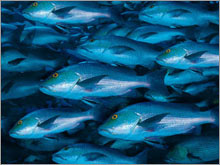Problem no. 6: OverfishingKona Blue's deep-ocean aquaculture could help save declining fish populations.SAN FRANCISCO (Business 2.0 Magazine) -- The background: Overfishing is severely depleting wild ocean fish stocks and threatening the $158 billion commercial fishing industry. The number of fish caught annually is declining, with a recent study projecting that the world's commercially harvested fish populations could collapse by 2048. The solution: Hawaii startup Kona Blue is pioneering deepwater aquaculture to farm ocean fish and take the pressure off wild species. Although many companies grow freshwater tilapia and catfish, few have succeeded in farming flavorful deep-sea fish like yellowtail tuna and swordfish that are in demand at sushi bars and high-end restaurants. That's because ocean fish are harder to hatch. Privately held Kona Blue raises a yellowtail-like fish off the coast of the Big Island of Hawaii - half a mile out to sea and 30 feet down.  Marine biologists Dale Sarver and Neil Anthony Sims founded Kona Blue in 2001, initially focusing their efforts on Hawaiian amberjack, a native species similar to yellowtail that is called kampachi in Japan and is popular as sashimi. The fish, though tasty, was rarely sold commercially because it's vulnerable to parasites and ciguatera, a reef borne illness that causes neurological dysfunction in humans. Unlike conventional practices of stocking hatcheries with wild fry, the raising of amberjack takes place in a controlled environment from hatch until harvest, limiting their exposure to parasites and diseases. Once the fish reach three-fourths of an inch in length, they are transferred to 50-foot-tall underwater cages to be harvested when they reach 5 to 6 pounds. The fish retail for about $20 a pound. The company has branded the fish as Kona Kampachi and has registered for a trademark. "Kona Blue is as close to a sustainable marine fish farm as possible with today's technology," says Charles Angell, a sustainable aquaculture consultant in Washington. "The environmental impact is greatly reduced by locating offshore in deep water with strong currents." The payoff: Former Horizon Organic chairman Tom McCloskey and a group of investors have sunk nearly $10 million into Kona Blue during the past two years. McCloskey, now Kona Blue's chairman, says sales will reach $8 million to $10 million in 2007, up from just $2 million last year. Kona Blue has begun distribution at select Whole Foods (Charts) stores, and Kona Kampachi is already gracing tables at top restaurants such as the French Laundry in California's Napa Valley. Aquaculture is a $70 billion global business, and demand for ocean-farmed fish is expected to rise as a result of no-fishing zones imposed by some U.S. states, as well as diners' concerns about the environmental impact of freshwater and near-shore fish farms. The opportunity: Kona Blue does not yet have any direct competitors employing its fish-farming techniques, though a couple of companies are gearing up ocean aquaculture operations. Those interested in starting their own sea farms are halfway there if they've done their due diligence in selecting a salable, noninvasive fish suitable for growing in deepwater pens. After all, there are other fish in the sea and room for plenty more down on the farm. |
Sponsors
| ||||||||||
